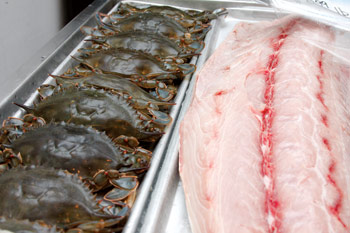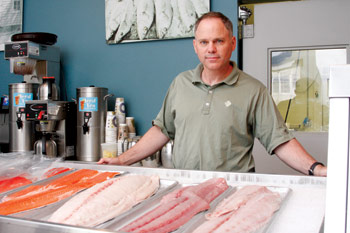As the oil from BP's recent catastrophe continues to gush into the Gulf of Mexico, the oil spill's impact on aquatic life is proving severe. Fragile oyster beds are in danger of being decimated, and the Gulf shrimp population is likely to be nearly wiped out for years to come.

Not only is this disastrous for the already-taxed ecosystem of the Gulf, it's also a dire situation for the people that make their living from its waters. As purveyors turn away from Gulf Coast seafood, we can expect to see more imported seafood at our grocery stores which means money ripped from the hands of the Gulf's fishing families, and farmed fish of dubious quality.
"This is devastating news for people that make their living in the Gulf states as fishermen," says Tracy Griffin, who owns locally based Blue Water Seafood company, and works closely with family-owned seafood purveyors from the region. "These people are ruined. The oyster beds are ruined. I don't know what kind of cleanup they can do to help these oyster farmers. Next year's harvest of wild Gulf shrimp is also ruined."
The National Oceanic and Atmospheric Administration confirms in a recent report that the spill has severely damaged the shrimp population, and warns that the economic impact could be extensive. The Gulf coastal areas harvest the largest haul of shrimp in the country, with 73 percent of the nation's total. Louisiana alone reported $130.6 million in dockside value of its shrimp haul in 2008.
The Gulf region is also responsible for nearly 70 percent of the nation's oyster harvest from once-rich beds, now awash with crude. All of this spells a loss of millions of dollars to coastal communities that can't afford it some of which are still reeling from Hurricane Katrina. At press time, a fishing ban has been placed over approximately 19 percent of the Gulf of Mexico.
Blue Water Seafood is already switching gears in response to this tragedy, turning toward other areas for seafood. Sales manager Cody Stokes reports that Blue Water Seafood is sourcing fish from the Pacific Northwest, as well as farmed fish. As of now, Atlantic fish is still safe to eat, as well as deep water Gulf fish, but that could potentially change if the oil spreads and flows around the tip of Florida.
"I hope it doesn't," says Stokes. "If it does, we're going to be eating a lot of fish from Asia. Supply isn't going to be an issue." The issue, he says, is the way that Asian fisheries are often managed. "There's some clean fish down there, but most of it is not. It's just farmed however the hell they want to farm it."

"As far as locally," adds Stokes, "If the impacts are huge enough to where we're not getting good enough quality (of) domestic fish, people are going to turn to eating more farmed fish, local trout, and even more meat."
To that end, Blue Water Seafood is preparing themselves by stocking other sources of protein that are available locally, like Hickory Nut Gap pork, Everett Farms beef and East Fork Farms lamb. "We're just trying to position ourselves to be an alternative source if we can't get the quality of fish that we've been getting in the past," says Stokes.
Though farm-raised fish often gets a bad rap, Griffin points out that there are plenty of regional fisheries that utilize sustainable methods. "We're getting great farmed catfish out of Aiken, South Carolina, and farmed mountain trout from Sunburst [Trout Farm, in Canton]," she says. "There's also a couple of shrimp farms in North Carolina that are up and coming, and some prawn farms in eastern North Carolina."
Not all farm-raised fish are created equal, she says, adding that tighter rules on fish farming farming need to be implemented, especially if the oil contaminates the Atlantic. "Somebody is going to have to step in to make sure that farming standards are what they should be with the feed, the way they're caught, held, contained. Farming practices in general have to be more carefully monitored." Griffin adds that all of the fish that Blue Water carries is sustainably raised or caught, as well as rigorously tested for quality.
Blue Water Seafood employee Chas Edwards reports that, in her experience working at Blue Water in Hendersonville, consumers seem deeply on edge when it comes to seafood. "We've already had people come into the store that ask questions like, 'Are you getting those crawfish from Louisiana, or are they coming from Indonesia or China?'" she says. "They don't want to buy them if they're not. It used to be the other way around, because it was generating revenue for our country. Now they see Gulf shrimp and they don't want to buy it, even if we assure them that it's safe. On a small level, on a local level, yes, it's impacting our retail sales already."
Being forced to turn away from Gulf seafood, Edwards adds, is stressing other regions. The oyster populations in the Virginia waters are quickly dwindling, for example. "What bothers me is the exchange," she says. "If you have one system where the resources have been depleted, then you overtax another backup resource, and it becomes depleted. It's not a natural ebb and flow for any ecosystem, period, whether it's farmed or natural."
Griffin says that consumers will feel a pinch at the market as a result. "Unfortunately, it's going to drive prices up. It's already driving prices up on the east coast oysters. What's going to happen is that a lot of people are simply going to just stop carrying oysters."
As far as her own business goes, Griffin remains optimistic. "I'm not scared, because we can source product from reputable vendors. I would be concerned if we didn't educate the public that it's still OK to eat our seafood."
"We're a small enough company that we can react quickly to the changes in the industry in general," says Stokes. "Some of our competitors have millions of dollars worth of product in a warehouse in freezers, or contracts with companies that they have to buy from."
Stokes pauses, then adds,"I'm more worried about the oysters in general than the business lost. It's going to affect those beds for so long."Blue Water Seafood Company is located in Hendersonville, and is opening a second location on Charlotte Street in north Asheville. They currently provide seafood to approximately 80 local businesses. To find out more, visit www.bluewaterseafood.net/site/
Mackensy Lunsford can be reached at food@mountainx.com



Before you comment
The comments section is here to provide a platform for civil dialogue on the issues we face together as a local community. Xpress is committed to offering this platform for all voices, but when the tone of the discussion gets nasty or strays off topic, we believe many people choose not to participate. Xpress editors are determined to moderate comments to ensure a constructive interchange is maintained. All comments judged not to be in keeping with the spirit of civil discourse will be removed and repeat violators will be banned. See here for our terms of service. Thank you for being part of this effort to promote respectful discussion.